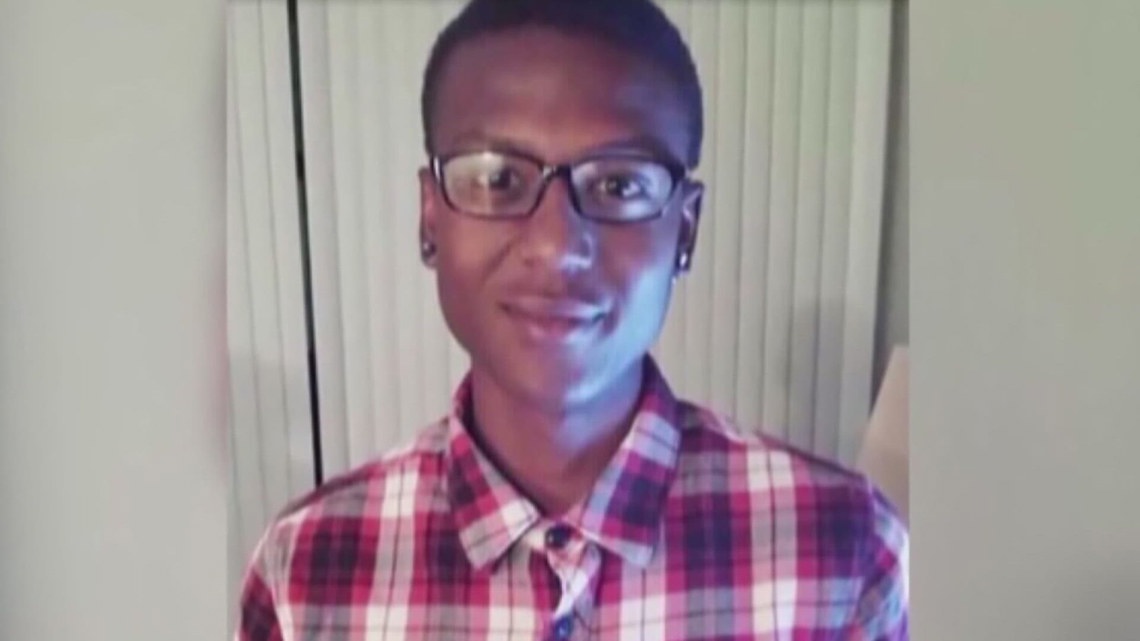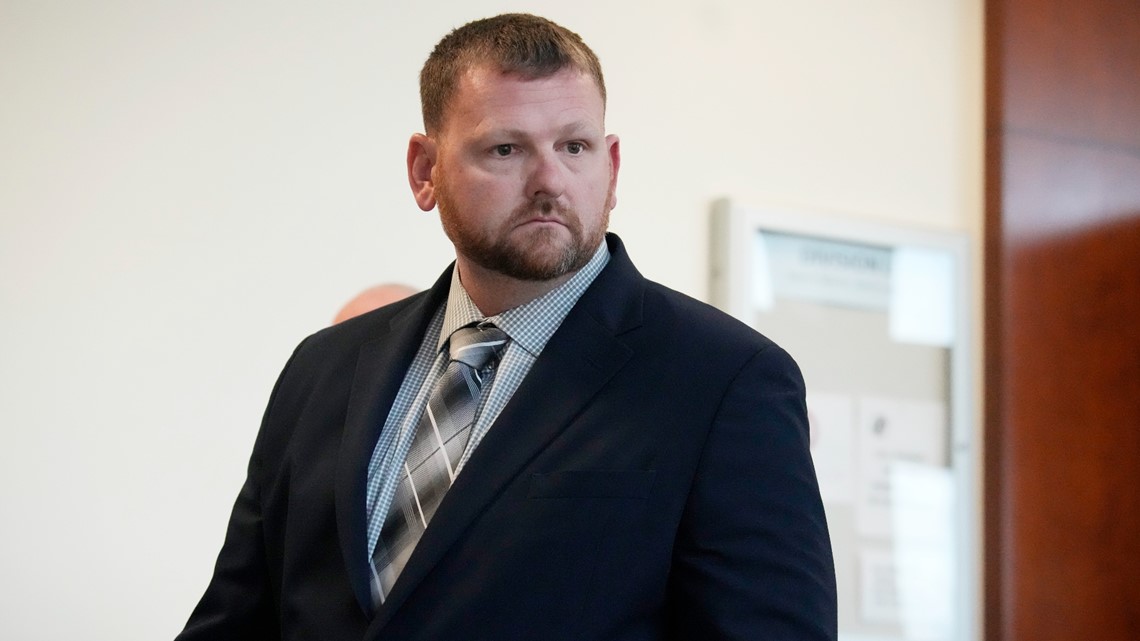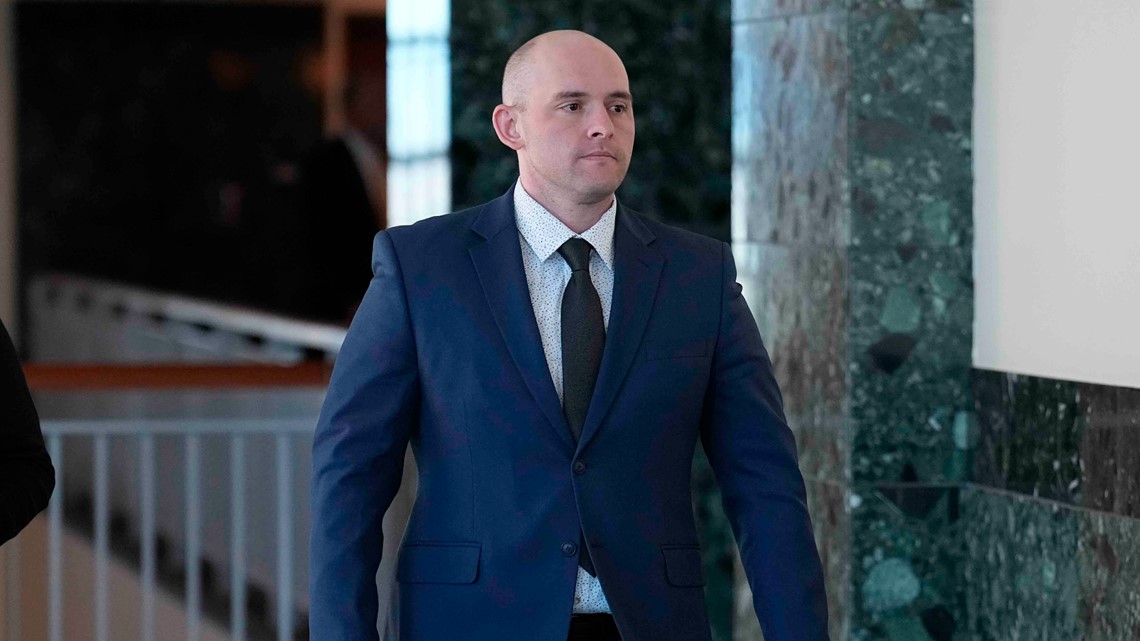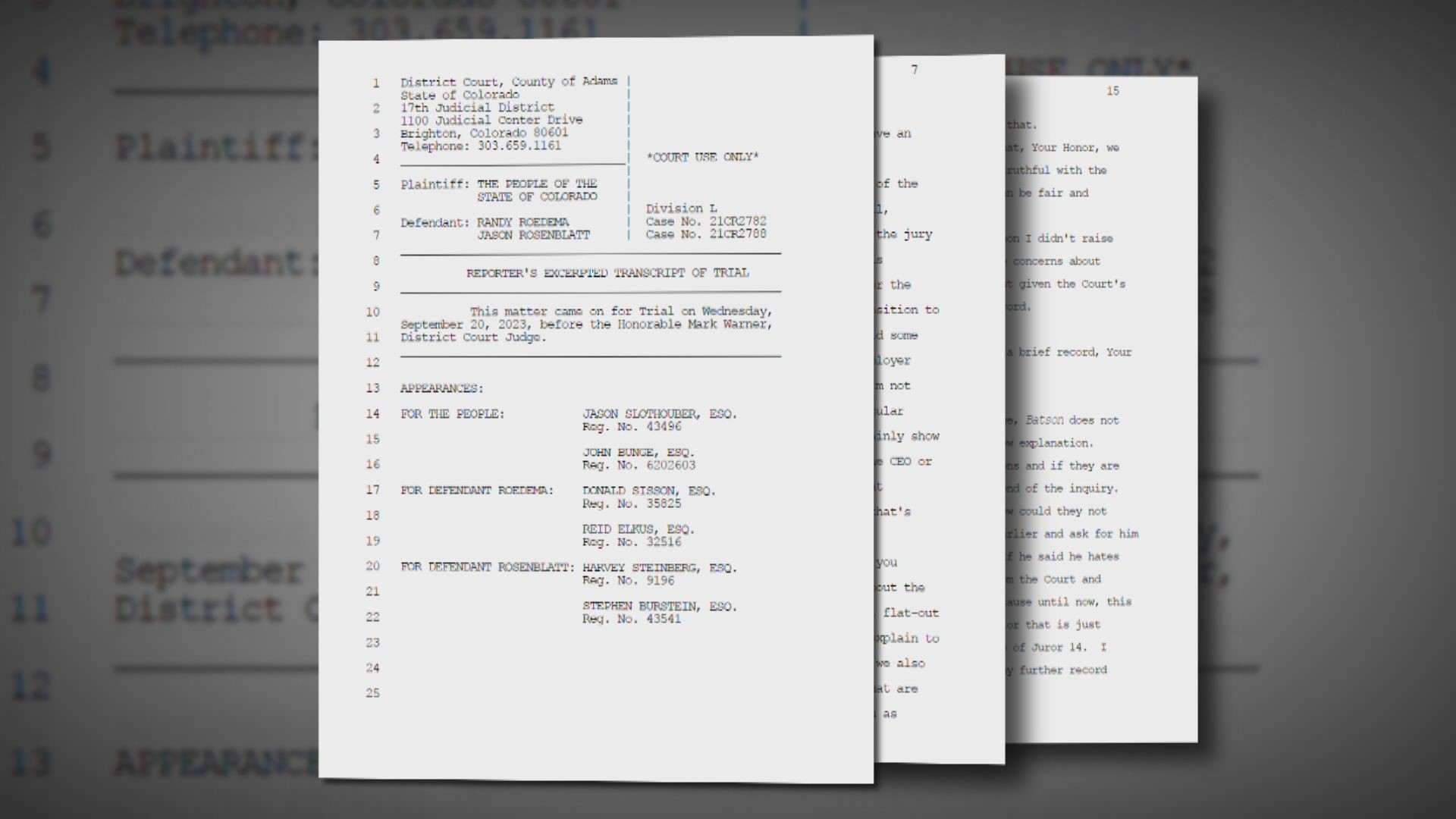AURORA, Colo. — An Aurora Police detective’s observations played a pivotal role in the dismissal of a Latino juror as two officers went on trial in the death of Elijah McClain, according to a newly unsealed court document.
That undercover officer told the judge in a closed-door proceeding that she overheard the man, identified only as Juror 14, say “odio la policia” – Spanish for “hate the police” – during a phone call in a courthouse hallway.
In that same session, held out of public view and shrouded in mystery, the man said he didn’t remember saying that but did not specifically deny that he did.
Adams County District Judge Mark Warner, who earlier concluded that defense attorneys improperly struck the man from the jury because of his race, ultimately decided to dismiss the man from the panel.
Opening statements began a few hours later with a largely white jury considering the case against two Aurora police officers indicted in the death of McClain, a 23-year-old Black man.
The sequence of events played out Sept. 20, during the final stages of jury selection for the racially and politically charged trial of Randy Roedema and Jason Rosenblatt, two of the five first responders accused of wrongdoing in McClain’s 2019 death. Court officials declined that day to answer questions about what happened after the judge, prosecutors and defense attorneys left the courtroom and met privately for several hours.
In January, Colorado Public Radio filed a petition in court to unseal the transcript of the proceedings. Warner granted it Feb. 9.
Warner, who presided over all three criminal trials connected to McClain’s death, ordered one redaction from the 86-page transcript before its release: The identity of Juror 14.
The sequence of events that led to his dismissal played out in a jury room not accessible by the public and over the lunch hour behind the locked doors of Courtroom 402 at the Adams County Justice Center in Brighton, according to the transcript.
It saw both prosecutors from the Colorado Attorney General’s Office and defense attorneys accuse the other side of improperly dismissing multiple jurors based on race.
The 86-page transcript details the situation that included the undercover investigator’s acknowledgement that she was gathering intelligence at the trial of two officers – both former colleagues. The undercover officer told the judge that during a break she was standing in a line outside a women’s restroom, with six or seven prospective jurors, when she overheard Juror 14 talking on the phone as he was within 5 or 6 feet of her.
The undercover officer told the judge she was at the trial to gather intelligence on potential protesters, noting that Aurora’s municipal courthouse was damaged during demonstrations in 2020.
Attorney Scott Robinson, a 9NEWS legal analyst, said he found the situation unusual and that he was particularly bothered that the undercover officer, by her own admission, was around prospective jurors.
“What troubles me is that if you're in there as an undercover officer, you really have no business being in a line with jurors,” Robinson said. “That sounds a little bit like attempting to eavesdrop on conversations. … That kind of eavesdropping is really not consistent with the fair administration of justice.”
“We feel like this is a nonissue,” said Aurora Police spokesman Joe Moylan. “It was handled the day of.”
Moylan said the decision to assign an undercover officer to the courthouse was made by a supervisor in the department’s intelligence unit.
“The intelligence unit operates on its own and has the authority to make those kinds of decisions,” Moylan said.
Lawrence Pacheco, a spokesman for the Colorado Attorney General’s Office, which prosecuted the case, declined to comment.
Elijah McClain's death
The Aug. 24, 2019, confrontation involving officers and McClain – and the man’s subsequent death – sparked outrage in the community.
The incident began when a 911 caller reported seeing a man with a mask who seemed “sketchy.” Officer Nathan Woodyard responded and confronted McClain on an Aurora street as McClain walked home from a convenience store carrying a plastic grocery sack containing three cans of tea and listening to music on ear buds.
Roedema and Rosenblatt joined Woodyard moments later, and the three of them physically subdued McClain.
During the struggle, Roedema told the other officers that McClain tried to grab Rosenblatt’s gun – an assertion that prosecutors repeatedly questioned. Rosenblatt and then Woodyard used a neck hold aimed at rendering McClain unconscious as they tried to take control of him.


After that, according to multiple medical experts, McClain vomited and inhaled some it, then suffered a series of problems, including low levels of oxygen and high levels of acid in his body.
McClain said repeatedly “I can’t breathe” before two paramedics injected him with the sedative Ketamine.
McClain’s heart stopped a short time later. Although paramedics successfully restored his pulse, he never regained consciousness and died three days later.
Then-Adams County District Attorney Dave Young cleared the officers and paramedics of wrongdoing. In 2020, after numerous questions raised about the incident, Colorado Gov. Jared Polis appointed Attorney General Phil Weiser special prosecutor, and he reopened the investigation.
Weiser took the case to a statewide grand jury, and it indicted Roedema, Rosenblatt and Woodyard, as well as paramedics Peter Cichuniec and Jeremy Cooper.
Roedema and Rosenblatt, both facing charges of reckless manslaughter and second-degree assault, were the first to go to trial.
How jury selection works
Jury selection begins with a pool of people filling out a questionnaire. Some can be dismissed after that based on the answers they give. The rest are brought into the courtroom for questioning by prosecutors, defense attorneys and the judge – a process known as voir dire.
After that, prosecutors and defense attorneys can seek the removal of prospective jurors two ways.
They can challenge for cause: a process during which they assert to the judge that a prospective juror should be dismissed because of an answer to a question or a circumstance in that person’s life. It can be for a hardship, such as a business owner who can’t afford to be away from work or someone with a scheduled medical procedure. It can be a past experience that raises the question of whether that person could be fair and impartial.
In some cases, the prosecution and defense will agree on a challenge. In others, one side may ask for the removal of a person and the other side may disagree. In that instance, the judge makes the call.
Each side gets an unlimited number of challenges for cause.
After that process, each side gets a limited number of what are known as peremptory challenges that allow them to remove a prospective juror without stating a reason.
In the trial of Roedema and Rosenblatt, the judge gave each side 10 peremptory challenges.
Despite the fact that the attorneys don’t have to explain a peremptory strike, they can be challenged under a 1986 Supreme Court ruling in Batson v. Kentucky. An attorney who makes what’s known as a Batson challenge makes an accusation that a peremptory challenge was race based.
When that happens, the attorney who removed the juror must be able to articulate a race-neutral reason for using a peremptory strike.
Defense attorneys twice tried to remove Juror 14 from the panel – first for cause. That was based on the man’s statement that he had been stopped by Aurora Police on multiple occasions and felt he was racially profiled and, according to the transcript, because he seemed unable to grasp some of the complex legal issues in the case.
Still, the man told the judge despite his past experience, he could be a fair and impartial juror, and Warner denied the request to strike him for cause.


What happened behind closed doors
The selection of the 12 people who would hear the case, plus two alternates, moved into its fourth day on Sept. 20. At that point, Juror 14 was still on the panel.
That morning, attorneys for Roedema and Rosenblatt used their first peremptory challenge to remove Juror 14. As with all of the jurors removed with peremptory challenges, the judge told the man to stay in the courtroom until the process was concluded.
After the two sides used all their peremptory challenges, the jury was tentatively set.
The judge and the attorneys conferred at the bench out of earshot of others in the courtroom.
Then the judge sent the prospective jurors on a break and announced that he and the attorneys needed to discuss some issues. They headed out a back door of the courtroom to an area of the building the public doesn’t have access to.
The newly released transcript details what happened, beginning just before 10 a.m. in a jury room.
Jason Slothouber, senior assistant attorney general and the lead prosecutor on the case, told Judge Warner he was lodging a Batson challenge on the defense’s dismissal of five jurors.
Among them was Juror 14.
“Half the defense strikes were targeted at persons of color,” Slothouber said.
The defense attorneys would subsequently accuse prosecutors of violating the Batson standard by dismissing only white jurors.
Initially, the judge sided with prosecutors with respect to Juror 14, concluding that his removal with a peremptory challenge “was motivated in substantial part by discriminatory intent.”
He granted the Batson challenge.
“So, what does that mean – you’re putting him back on the jury?” asked attorney Harvey Steinberg, who represented Rosenblatt.
“Correct,” Judge Warner said.
A few moments later, one of Roedema’s attorneys, Donald Sisson, said there was “another issue on 14.”
At that point, Steinberg told the judge about the undercover officer and a message about what she heard.
The discussion of what to do with Juror 14 that took up much of the rest of the morning and stretched into the lunch hour.
Warner first brought the undercover officer into the jury room, then asked her what she was doing in the courtroom.
She said her “main priority” for the day “is seeing what the courtroom is like, seeing if there’s any protesters that show up. If there are any protesters, listen and see – are they going to try to storm our municipal court again, are they going to come protest here.”
Later, under questioning by Slothouber, she said, "It’s just to see what types of people are showing up as spectators in regards to protests and the security of our municipal court. As you know in 2020, our court was ambushed, in other words, and windows were broken, people were trapped inside the buildings – so that is my main priority here is for the safety of the City of Aurora.”
The officer told the judge the previous day that she sat in the courtroom and saw Juror 14 being questioned – then recognized him later as she waited to use the restroom. At that point, she said, he was on the phone.
The officer said she overheard snippets of what he said – “esta bien” (it’s good), “aqui” (here), and “odio la policia” (hate the police).
“I couldn’t hear the entire thing because I was in line for the restroom and the women were talking about not having enough stalls but those were the words that I recalled hearing when he was walking by,” the undercover officer said, according to the transcript.
Then the judge brought Juror 14 in for questioning.
The man acknowledged that he had used the phone, talking to his mother in Central America.
“I didn’t mention anything about the case,” he said. “I just mentioned that I got asked a couple of questions, that’s it, and how I responded to them, that’s it.”
Slothouber asked the man specifically whether he had used the phrase “idio la policia” during the call.
“I don’t remember that phrase,” Juror 14 replied. “To be honest with you I don’t, but if you guys have any recordings or anything like that, would you guys please show it to me.”
After attorneys for both sides spoke, the judge decided to remove Juror 14, concluding that allowing him to remain on the jury “would really result in a manifest injustice based upon the totality of the circumstances of the case."
“And I’m not going to specifically find that Juror Number 14 deliberately misled the court, but certainly his statement in the hallway that the court finds credibly that he made certainly undermines the candor of his statements made in voir dire,” Warner said.
None of the other Batson challenges changed the makeup of the jury. Some were withdrawn after discussion, and Warner denied the others.
After a three-week trial, the jury acquitted Rosenblatt of all charges but convicted Roedema of criminally negligent homicide and third-degree assault.


No further intelligence gathering
Moylan, the Aurora Police spokesman, said that after the closed-door hearing, Weiser requested a meeting with then-Police Chief Art Acevedo. During that meeting, the two agreed that the Attorney General's Office and the Aurora City Attorney’s Office would be in direct communication and there would not be further intelligence gathering at that trial.
There was also none on the trials of Woodyard or the two paramedics.
“I don’t think our undercover (officer) did anything wrong,” Moylan said.
Robinson, the 9NEWS legal analyst, said the key moment captured in the transcript came when Juror 14 failed to specifically deny that he made the statement “odio la policia.”
“That's significant,” Robinson said. “And that certainly made the judge's job and ruling on the challenge much easier. The judge specifically found that the officer was credible, and that finding of credibility was certainly aided by the fact that the potential juror did not affirmatively deny saying that he hated police.”
Robinson said in general “it would not be appropriate for a law enforcement agency to have a member undercover in the audience during any kind of criminal trial.”
Despite the officer’s assertion that she was there to be on the lookout for protesters who might cause trouble, Robinson said “it would make me uncomfortable to have an undercover officer listening to anyone, let alone being in line with potential jurors to go to the restroom.”
SUGGESTED VIDEOS: Elijah McClain death

